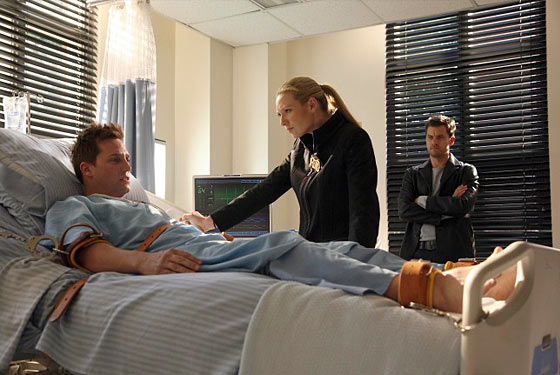
Dunham is taking the death of her good friend and fellow agent Charlie hard. At least we think she is ÔÇö she so rarely breaks from her glum look of pursed-lip seriousness that itÔÇÖs difficult to be sure. SheÔÇÖs still reeling from the fact that she had to kill Charlie (or, rather, Evil Shape-Shifter Charlie), but because sheÔÇÖs such a cold fish in general itÔÇÖs hard to muster much sympathy for her. In fact, her charisma seemed even more lacking contrasted with a new character who doesnÔÇÖt have just one personality, but two.
The Evil: In Seattle, random people are having hallucinations that cause them to strike out violently at those around them and then die.
The Determination: The victims were all part of a brilliant researcherÔÇÖs experiment to cure insomnia by placing a biochip into their brains. But in truth, heÔÇÖs stealing his patientsÔÇÖ dreams in order to fuel his addiction to the rush of other peopleÔÇÖs powerful unconscious experiences. This has created a Jekyll-and-Hyde split within himself, and brings about his victimsÔÇÖ deaths.
Intel on Massive Dynamic: Nina SharpÔÇÖs friend Sam Weiss pulled off a neat parlor trick by telling Dunham that, to get over her guilt and sadness about CharlieÔÇÖs death, she had to ask different people wearing red in Seattle for their business cards. From there, she was to circle two letters in their name, which would form a phrase that would give her guidance. Sure enough, the resulting phrase ÔÇ£YouÔÇÖre gonna be fine,ÔÇØ was something Charlie had told her back when she was just starting out as a nervous young agent. Since SamÔÇÖs so good at predicting things and reading DunhamÔÇÖs emotions, wouldnÔÇÖt it have been easier just to tell her all that back at the bowling alley?
Wacky Factor: As soon as Walter arrives in Seattle, heÔÇÖs desperate to leave ÔÇö the cityÔÇÖs wet smell makes him feel like heÔÇÖs back at the institution. But he seems to be back to his (relatively) normal self once he returns to Boston, after enduring a flight that was hit by severe turbulence. ÔÇ£I screamed like a little girl,ÔÇØ he announces, with quiet, crazy-eyes intensity.
Paranoia Level: Faint. When a particular episode doesnÔÇÖt further the seriesÔÇÖs central mythology about nefarious shape-shifters, bald-headed weirdos, and Leonard NimoyÔÇÖs character, Fringe strains instead to construct stand-alone procedural-thriller plots that are half whodunit and half Twilight ZoneÔÇôlike commentary on the human condition. So you end up landing on dialogue like this, spoken at episodeÔÇÖs end by Joshua Jackson as he sums up the now-dead researcher: ÔÇ£I guess thatÔÇÖs the irony. His addiction to dreams became his nightmare ÔÇö one that he couldnÔÇÖt wake up from.ÔÇØ JacksonÔÇÖs work on the show is far from Emmy-worthy, but a commitment to such hokey dialogue deserves some sort of special citation, right? And what did Dunham say in response? Nothing. But hey, she sure pursed her lips well.

